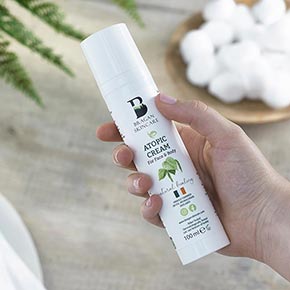How to Treat Scars on the Face: A Complete Guide to Soothing and Healing Skin
Scars on the face can feel like a daily reminder of past skin troubles or injuries. Whether it’s from acne, an accident, or a medical procedure, facial scars can sometimes impact confidence. But the good news is, with the right care and some patience, you can reduce their appearance and bring comfort to your skin. In this guide, we’ll look at how to treat scars on the face effectively. We’ll explore different treatments, skincare tips, and, of course, recommend Bragan Skincare’s Atopic Cream, which is specially formulated to help with scar care and skin recovery. Let’s begin the journey to smoother, healthier skin.
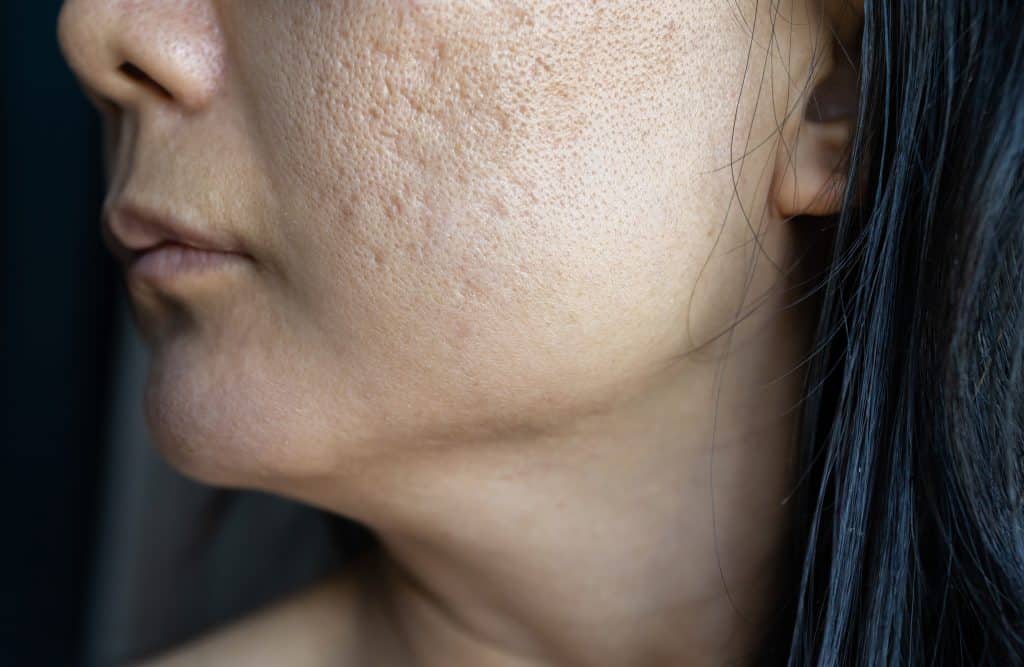
Understanding Facial Scars-How to Treat Scars on the Face
First, let’s talk about what scars are. Scars form when the skin repairs itself after an injury. The body produces extra collagen to heal damaged skin, which can sometimes result in scarring. Whether raised, sunken, or flat, scars often feel different from the surrounding skin.
Common Types of Facial Scars:
- Atrophic Scars: These are depressed scars that look like small indentations. They are often caused by acne or chickenpox.
- Hypertrophic Scars: Raised scars that stay within the boundaries of the original injury.
- Keloid Scars: Raised scars that grow beyond the original area, often becoming larger over time.
- Hyperpigmentation: Dark spots left behind after an injury or acne heals, which isn’t technically a scar but can look like one.
Understanding the type of scar you’re dealing with can help you choose the best treatment. Now, let’s dive into different ways to treat facial scars effectively.
How to Treat Scars on Face: Tips and Techniques
There are several methods for treating scars, from home remedies to specialised skincare products and professional treatments. Here are some approaches to consider.
1. Moisturising with a Quality Cream
Moisturising is essential for all skin types, but it’s especially important when caring for scars. Regular hydration helps keep the skin soft, which can reduce the appearance of scars over time.
- Use Bragan Skincare’s Atopic Cream: This cream is designed to moisturise deeply and soothe the skin. Enriched with snail mucin, it’s perfect for helping with scar recovery. Snail mucin contains natural healing properties that can soften scar tissue and improve skin texture.
- Apply Daily: Moisturising twice a day is ideal for scar care, especially if you’re using a nourishing cream like Bragan Skincare’s Atopic Cream.
2. Gentle Massage
Massaging the scar area can help increase blood flow, which encourages healing. It can also prevent the scar from becoming stiff or raised.
- How to Massage: Use your fingertips and apply gentle, circular motions around the scar. Do this for about 5 minutes daily.
- Use Moisturiser During Massage: Applying a cream, like Bragan Skincare’s Atopic Cream, during the massage can enhance the effect and provide extra hydration.
3. Use Sun Protection
Scars are particularly sensitive to UV rays, which can make them darker or more noticeable. Protecting your skin from the sun is crucial in scar care.
- Wear Sunscreen Daily: Look for a broad-spectrum sunscreen with SPF 30 or higher.
- Wear a Hat: On sunny days, wearing a hat provides extra protection for facial scars.
Why Bragan Skincare’s Atopic Cream is Ideal for Scar Treatment
When choosing a cream to help treat facial scars, it’s essential to pick one that’s gentle, hydrating, and packed with skin-friendly ingredients. Bragan Skincare’s Atopic Cream fits these criteria perfectly. Here’s why it’s highly recommended:
1. Soothes and Heals with Snail Mucin
Snail mucin is a powerful ingredient known for its healing and hydrating properties. It helps soften scar tissue, which can make scars look smoother and less noticeable over time.
2. Deep Hydration-How to Treat Scars on the Face
Hydration is key in scar care. This cream provides lasting moisture, which prevents scars from becoming dry or flaky. Keeping the scar area moisturised can improve its texture and appearance.
3. Gentle for Sensitive Skin
Free from harsh chemicals and fragrances, Bragan Skincare’s Atopic Cream is safe for sensitive skin. It won’t irritate the scarred area, making it suitable for everyday use.
Using Bragan Skincare’s Atopic Cream regularly can help improve the overall texture and appearance of facial scars. The cream supports the skin’s natural healing process, making it easier to manage scars and enhance skin comfort.
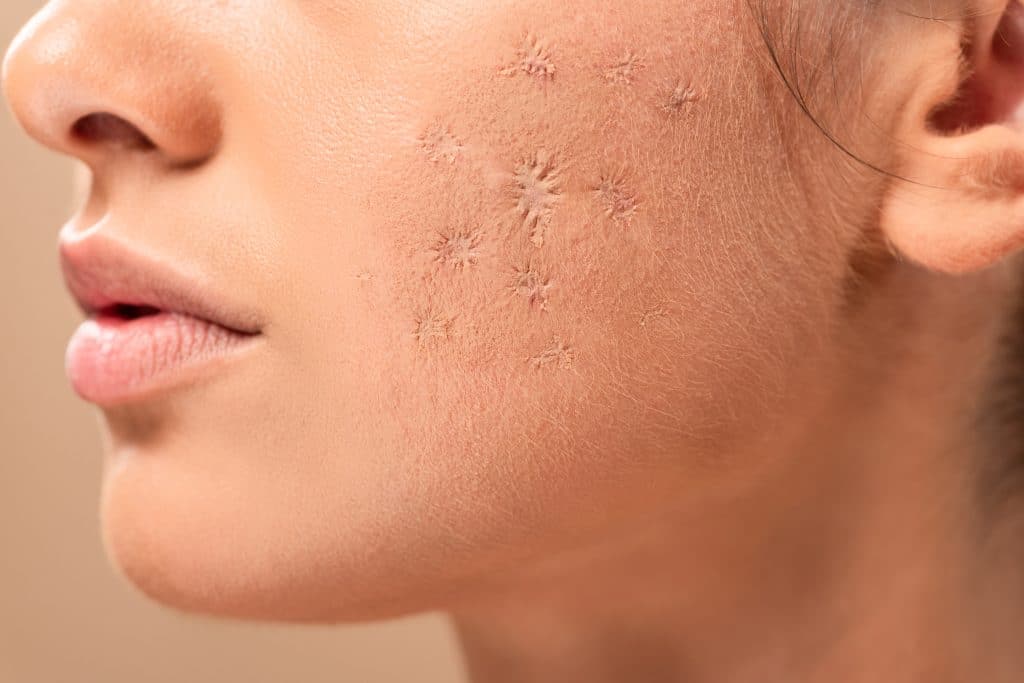
Natural Remedies to Support Scar Healing
In addition to using a quality cream, there are some natural remedies that can complement your scar care routine. These options are gentle, simple, and can be done at home.
1. Aloe Vera
Aloe vera is a soothing plant that’s often used in skincare for its cooling and healing properties.
- How to Use: Apply pure aloe vera gel to the scarred area and leave it on for 10-15 minutes before rinsing.
- Benefits: Aloe vera can help reduce redness and soften the scar tissue.
2. Honey
Honey is naturally moisturising and has mild antibacterial properties, which makes it great for skin healing.
- How to Use: Apply a thin layer of honey to the scar, leave it on for about 20 minutes, and rinse off with warm water.
- Benefits: Honey can keep the scar hydrated, which is essential for healing.
3. Coconut Oil
Coconut oil is rich in fatty acids, which help keep the skin moisturised.
- How to Use: Warm a small amount of coconut oil in your hands and massage it onto the scar.
- Benefits: It provides moisture and creates a protective barrier, which can help the scar heal over time.
Professional Treatments for Scar Reduction-How to Treat Scars on the Face
If you’re looking for more intensive treatment, there are professional options that can reduce scar appearance. However, these treatments should be discussed with a dermatologist or skincare professional.
1. Laser Therapy
Laser treatments can help reduce the appearance of scars by targeting the affected area with concentrated light.
- Ideal for: Hyperpigmented scars, hypertrophic scars, and some atrophic scars.
- Consult a Professional: To ensure safety, a qualified dermatologist should perform laser therapy.
2. Microneedling
Microneedling uses tiny needles to create micro-injuries on the skin, encouraging collagen production and improving skin texture.
- Best for: Depressed scars, like acne scars.
- Downtime: There may be slight redness or swelling after treatment, but it typically heals within a few days.
3. Chemical Peels
Chemical peels remove the outer layer of the skin, helping to reduce the appearance of scars and improve skin tone.
- Good for: Superficial scars and pigmentation issues.
- Frequency: Some people need multiple sessions for best results.
Daily Skincare Routine for Scar Care
A gentle skincare routine can make a big difference in the look and feel of scars on the face. Here’s a suggested routine that includes Bragan Skincare’s Atopic Cream to help support scar healing.
Morning Routine
- Cleanse: Use a mild, fragrance-free cleanser to keep your skin clean and fresh.
- Apply Bragan Skincare’s Atopic Cream: After cleansing, apply the cream to your scars. This will keep the area hydrated throughout the day.
- Sun Protection: Finish with a broad-spectrum sunscreen to protect the scars from darkening or worsening in appearance.
Evening Routine
- Cleanse: Gently wash your face to remove any impurities or makeup from the day.
- Apply Bragan Skincare’s Atopic Cream: Use the cream again to hydrate and support the scarred area overnight. Applying it before bed allows it to work while your skin regenerates.
- Moisturise: If needed, apply an extra layer of moisturiser to keep your skin well-hydrated.
Following this routine consistently can help maintain the hydration and health of your skin, promoting a smoother, more even texture.
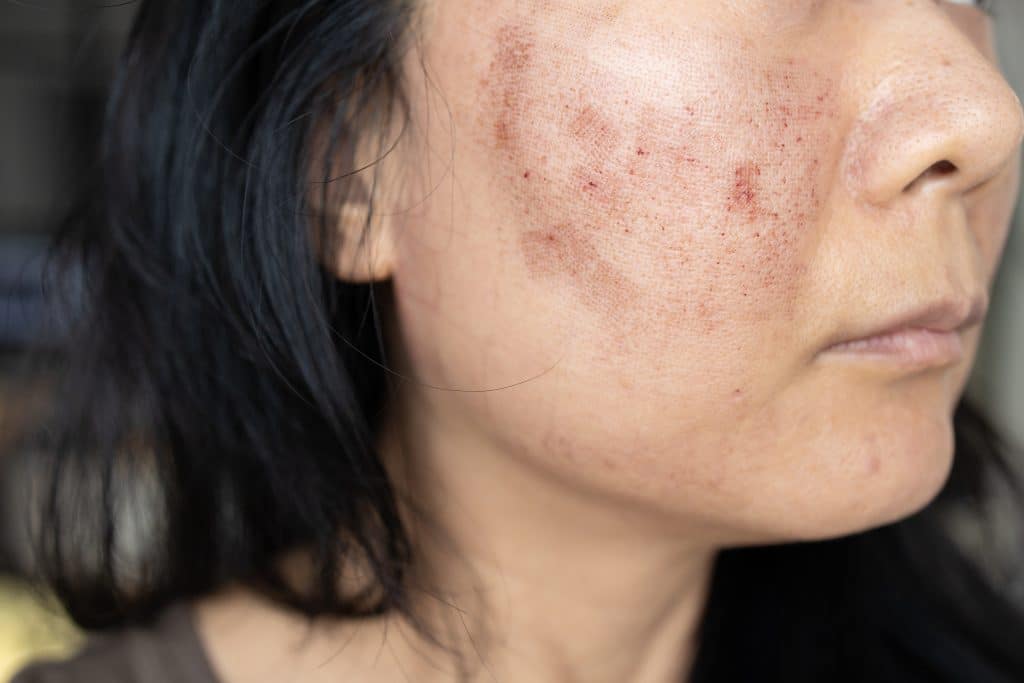
Frequently Asked Questions About How to Treat Scars on the Face
Here are some commonly asked questions to help address concerns about scar care.
Q1: How long does it take for scars to improve?
A: The time it takes to see results varies depending on the scar type and treatment. Some people see improvement within a few weeks, while others may take several months.
Q2: Can I use Bragan Skincare’s Atopic Cream with other scar treatments?
Yes, you can safely use Bragan Skincare’s Atopic Cream alongside other treatments like aloe vera or after professional procedures. However, always consult your dermatologist for personalised advice.
Q3: Does diet affect scar healing?
A: Eating a balanced diet with plenty of vitamins and minerals can support skin health. Foods rich in Vitamin C, E, and collagen can be beneficial for skin recovery.
Q4: Will scars completely disappear?
A: While scars may not completely vanish, with consistent care and treatment, they can become less noticeable over time.
Q5: Can I use Bragan Skincare’s Atopic Cream on fresh scars?
A: Yes, you can apply the cream to new scars to support the healing process as long as the skin has healed and there is no open wound.
Final Thoughts: Embrace Gentle Care for Scar Recovery
Treating scars on the face requires patience, consistency, and a gentle touch. Each small step in your skincare routine contributes to improving your skin’s texture, tone, and overall comfort. By incorporating high-quality, soothing products like Bragan Skincare’s Atopic Cream, enriched with snail mucin, you’re setting up your skin for success in the long journey of healing.
Remember, scar recovery is a gradual process. While you may not see results overnight, dedication to a gentle routine, paired with nourishing ingredients, can make a world of difference. Hydrating and caring for your skin daily helps not only in softening the appearance of scars but also in restoring your skin’s natural balance and glow.
As you continue with your skincare journey, keep in mind that every small improvement is a positive step forward. Your skin is resilient and capable of remarkable transformation with the right care. Bragan Skincare’s Atopic Cream offers a supportive, gentle approach, allowing you to feel confident in the choices you’re making for your skin.
Here’s to the journey toward smoother, healthier skin and the comfort that comes with knowing you’re giving your skin the best possible care.
By committing to a thoughtful routine and using products tailored for scar care, you’re embracing a journey of patience, self-care, and resilience. Each time you apply a gentle, hydrating product like Bragan Skincare’s Atopic Cream, you’re not only nourishing your skin but also fostering a sense of connection and kindness toward yourself.
It’s perfectly normal to feel a mix of emotions when dealing with facial scars. Some days, you may feel more patient; other days, you might feel frustrated. But remember that you’re not alone in this journey, and progress, however gradual, is still progress. With consistent care, your skin can become softer, smoother, and more resilient.
Celebrate Small Improvements
Each time you notice a slight softening of the scar or a smoother texture, take a moment to acknowledge your progress. Scar recovery may feel like a slow journey, but each improvement, no matter how small, is a testament to your dedication.
Be Kind to Yourself
Treating scars on the face isn’t only about the physical steps you take; it’s also about nurturing a positive mindset. Practising self-kindness and patience can be incredibly empowering as you work toward your skincare goals. Each day of consistent care builds on the last, helping you move closer to a healthy, balanced complexion.
Bragan Skincare’s Atopic Cream equips you with a powerful tool to support your skin’s natural healing process. Its gentle formula with snail mucin is here to hydrate, soothe, and enhance your skin’s recovery, giving you confidence in your skincare journey. Here’s to treating your skin with care, compassion, and the encouragement it needs to thrive, day by day.
Atopic Skin Repair Cream
Bragan Skincare Snail Mucin Atopic Cream At Bragan Skincare, we believe in doing things differently. Our Snail Mucin Atopic Cream isn’t just another product on the shelf—it’s a promise to your skin. Powered by the unmatched healing properties of pure snail mucin, this cream is specially crafted to soothe redness, calm irritation, and restore balance to even the most sensitive skin. Perfect for those suffering with Eczema, Psoriasis. Dermatitis and many other skin condition. Why snail mucin? Because it works. Packed with naturally occurring allantoin, glycolic acid, and peptides, it’s a game-changer for reducing redness, promoting repair, and deeply hydrating…
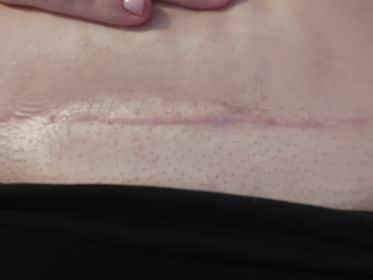
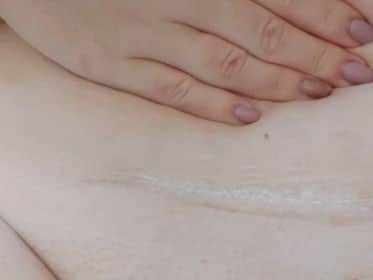
These are before and after photos of one of our customers after using the cream on her C-Section scarring.
Featured Bragan Skincare Products
-
€39.99 – €100.00Price range: €39.99 through €100.00Select options This product has multiple variants. The options may be chosen on the product page
-
€100.00Select options This product has multiple variants. The options may be chosen on the product page

